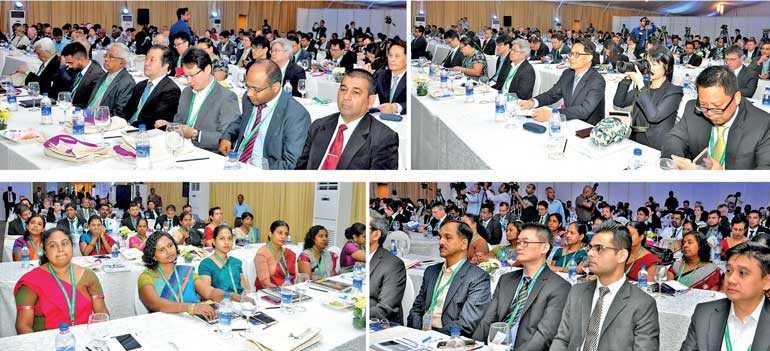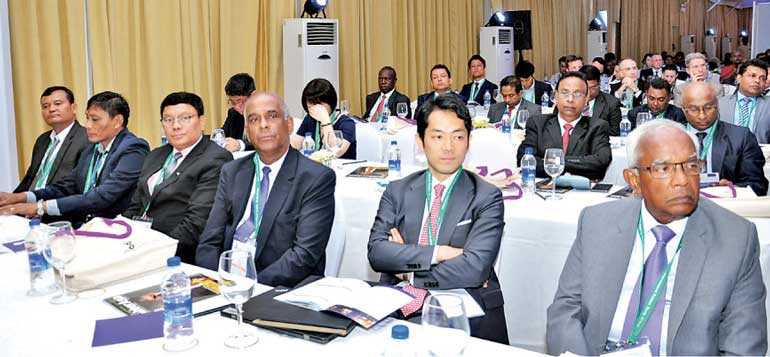Wednesday Feb 25, 2026
Wednesday Feb 25, 2026
Tuesday, 8 May 2018 00:00 - - {{hitsCtrl.values.hits}}



By Charumini de Silva
Plantation Industries Minister Navin Dissanayake yesterday called on a powerful gathering of global rubber industry giants in Colombo, who collectively influence over $400 billion in sales, to collaborate with their counterparts and find a solution that would enable farmers to leave the Government out of the equation, except as a fair and transparent regulator.
“Ideally there should be no subsidies, no incentives, and no bureaucracy overlooking the affairs of rubber production. I am aware that Brazil is moving in that direction, away from unproductive populism,” he said, delivering the keynote address at the inauguration of the World Rubber Summit 2018, themed ‘Breaking barriers towards sustainable growth’, organised by the International Rubber Study Group (IRSG) in collaboration with the Plantation Industries Ministry in Colombo yesterday (7 May).
As an industry that has been established for over a century, Dissanayake said, the rubber industry should take over its future destiny, governance and the well-being of its stakeholders, irrespective of them being smallholders or corporate giants.
The two-day meeting will see 40 speakers from around the world, sharing insights on current and future issues, challenges, opportunities, trends, consumption, technology and finding new markets to expand existing businesses.
Highlighting the rubber value chain as primarily a people’s industry, Dissanayake said his concern was the people’s prosperity and stability, which are crucial variables in the sustainability equation.
The Minister said the rubber production segment can promote sustainable development through carefully managed value chain processes, in plantations, smallholdings, factories as well as in trading houses.”Each of these can potentially provide benefits to individuals, communities and countries such as stable employment, public infrastructure, export earnings, building of human capital, Government revenues, and increased opportunities for related and supporting industries,” he added.
Noting that overall rubber is a good industry to be supported and sustained, the Minster added that we cannot take things for granted, as there are some concerns to be addressed. The poverty trap, environmental issues and participatory problem solving were outlined as ground realities in the rubber industry.
He noted that there is a mistaken belief of many governments that cushioning the impact of market vagaries faced regularly and cyclically by small farmers, through various intervention measures such as subsidies, free farm inputs and income support, is essential to their welfare.
“The Governments maintain costly structures to implement these measures. It seems that this populist belief is unsustainable, counterproductive and helps only the consumers to procure rubber at an artificial price, thus indirectly subsidising big business. Does the industry bear the cost of subsidies directly or indirectly? I see no evidence,” he pointed out.
Dissanayake raised concerns over subsidies, and other forms of Government assistance or regulation that are involved in sustaining an inefficient production system, as there exists a possibility of corruption creeping in.
He pulled no punches, interrogating the global rubber stakeholders on sustainable growth, equity and fairness in gains sharing, profit driven corporates, ethical behaviours versus regulated behaviour, IRSG’s sustainable Natural Rubber Initiative, taming market forces, climate change, technology, profit, and reactions to profits.
The Minister also said climate change and unpredictable weather patterns will impact rubber producers and businesses alike, making populations vulnerable and value chains dysfunctional, resulting in heavy losses and social unrest.
“Sustainability also has led to reporting climate-related risks, compelling transparency in multiple business practices. Public consciousness of sustainability issues, in a context of apathy of political leaders, will compel the business leaders themselves to lead sustainability initiatives, adapt or leave their businesses. The impact of climate change on rubber production is increasingly reported, but effective solutions are slow to emerge,” Dissanayake stated.
The raw rubber feeds a huge value added industry, and some experts predicts that by 2025, the world would need 17 million tons of natural rubber. In terms of Sri Lanka, he said his problem was the long time taken by an average rubber tree to produce latex in profitable volumes.
“In theory, rubber can be made profitable. In practice, most of our producers are unable to do so unless the prices are high. That is the reality and as policy makers we have to make pragmatic decisions that are fair to all,” Dissanayake pointed out. He said no region should look at another region with suspicion or be critical about the local policies, as every country has its own reasons, social, economic or political that leads to a particular decision. However, with open and sincere dialogue, everyone may find better ways to become sustainable and profitable.
Dissanayake warned that the world was entering an era of upheaval as well as surprises, considering the rapid political shifts taking place in regions like Korea, the US and China. It was pointed out that business-minded farsighted leaders in China and India are building an enduring partnership, suggesting economics drive politics.
“Let us think collaboratively and derive the benefits of synergies of sustainability across the rubber industry value chain,” the Minister emphasised.
IRSG Chairperson Aly Toure said the 2018 edition of the summit will examine ways to break the barriers towards sustainable growth, to enable both importers and exporters of natural and synthetic rubber to continue to reap the economic benefits of robust performance, which is also meaningful in social and environmental consideration. Acknowledging that IRSG values the contribution of each of its member Governments, Toure said they wish to attract a greater number of countries in the association from Asia, Africa, Europe and America. “To this effect, the group is undertaking a strategic review, which we hope will unlock the potential for a more relevant and efficient organisation.”
Toure also stated that the meeting promises to build exceptional networking and useful contacts, which could lead to future successful ventures for the benefit of all parties involved. ISRG Secretary General Salvatore Pinizzotto stated ‘Breaking barriers towards sustainable growth’ is not only the theme of this conference, but its call for action. “We, as the rubber sector, need to look at sustainability issues with great attention, because it is our responsibility. We need to ensure this industry grows in a sustainable manner in respect of environment, in an economically sound way and also overcoming social issues that are affecting these sectors,” he stressed.
Pix by Lasantha Kumara